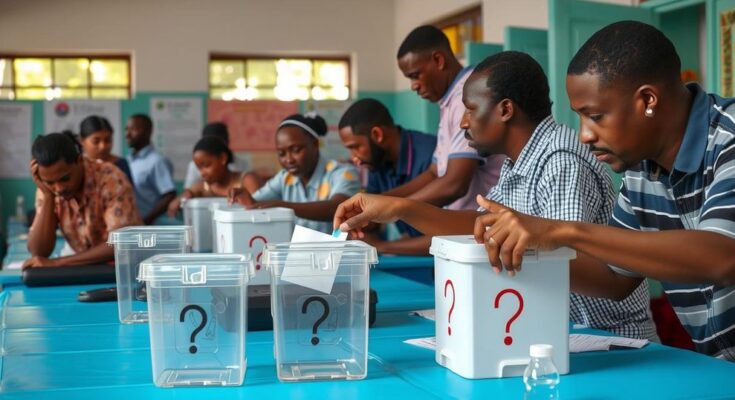Voters in Comoros are electing representatives for a newly structured 33-seat parliament amid allegations of electoral irregularities following President Azali Assoumani’s controversial re-election last year. Approximately 338,000 registered voters are participating, with polling stations opened early on Sunday. The election features nearly one hundred candidates, following Supreme Court approvals, as the opposition debates the best approach to challenge the ruling regime.
Voters in Comoros are participating in parliamentary elections for the 33-seat legislative assembly, following the controversial re-election of President Azali Assoumani last year. The vote is taking place amid allegations from the opposition regarding electoral irregularities, which officials from the ruling party have denied. Approximately 338,000 registered voters cast their ballots at polling stations that opened early on Sunday, as nearly one hundred candidates contest for parliamentary positions, following the Supreme Court’s approval of their candidacies.
President Assoumani has been in power since a coup in 1999 and has won three elections since. His critics assert that he is exhibiting authoritarian tendencies and speculate that he is grooming his eldest son, Nour El-Fath, to succeed him after his term expires in 2029. In 2024, President Assoumani bestowed significant responsibilities upon his son, placing him in charge of coordinating all governmental activities. Despite some opposition factions calling for a boycott, others encourage participation to highlight perceived flaws within the ruling regime.
Hamidou Karihila, an opposition candidate from the Hope of the Comoros party, remarked, “The Azali regime is weakened … by participating in these elections we are contributing to further exposing the flaws in its system and accelerating its inevitable fall.” Election results are anticipated by Friday, revealing the extent of voter engagement amid the tensions surrounding the political landscape.
The political environment in Comoros remains tense, particularly following allegations regarding the legitimacy of recent elections. After the controversial 2022 re-election of President Azali Assoumani, who has maintained power through various means since his ascent in 1999, ongoing concerns about democracy and governance persist. The present electoral process is scrutinized as opposition voices question the integrity and freedom of elections within the context of a ruling party accused of monopolizing power and undermining political dissent.
In summary, the parliamentary elections in Comoros serve as a focal point for ongoing tensions between the ruling government and the opposition, particularly in light of allegations of electoral misconduct. As citizens navigate the electoral process, the outcome will likely affect the future political landscape of the Indian Ocean nation, revealing both levels of public support for the current regime and the legitimacy of the electoral system. The juxtaposition of participation and calls for boycott illustrates the complex dynamics at play in Comoros’ governance and civil society.
Original Source: www.muswellbrookchronicle.com.au




